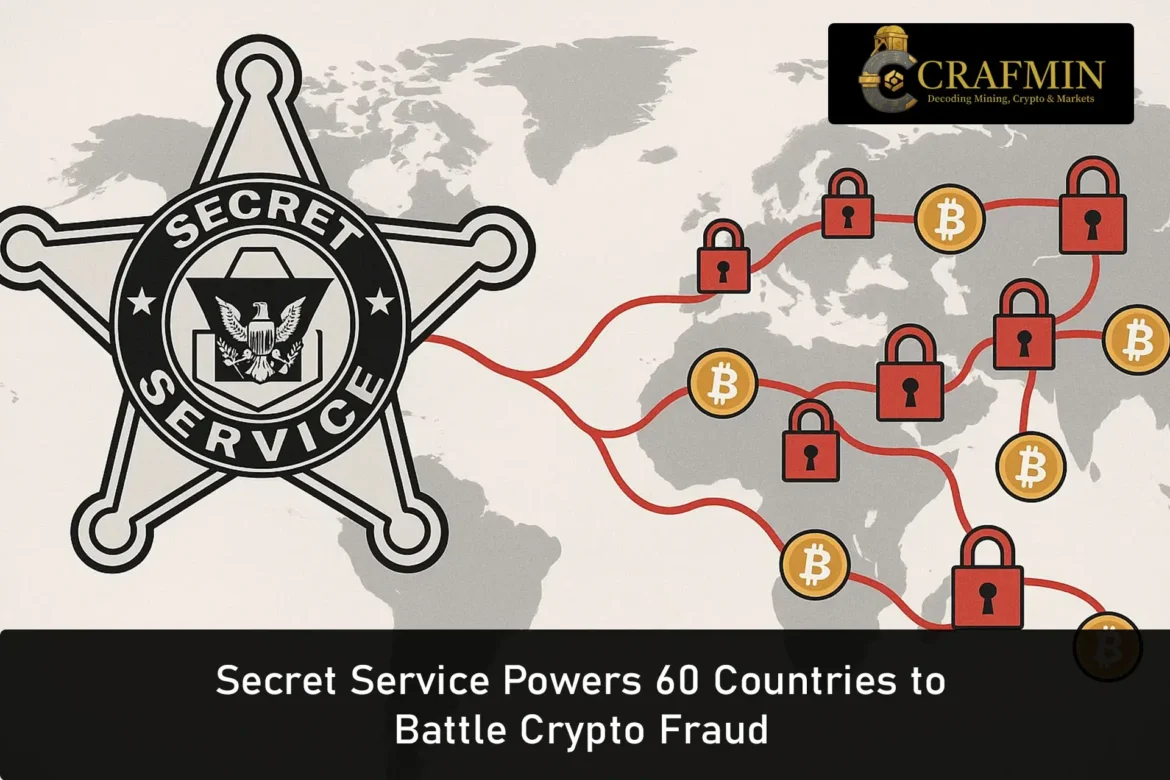The United States Secret Service has been a strong reaction to cryptocurrency crime all over the world, kicking off blockchain training for law enforcement officers in more than 60 countries. Through its Global Investigative Operations Center (GIOC), the agency is offering on-the-ground support to foreign units and teaching them how to track, analyze, and respond to criminal activity in the world of crypto.
This international effort comes at a pivotal time. As crypto cons schemes increasingly sophisticated and global in reach, law enforcement agencies globally are scrambling to catch up. Now, thanks to access to hands-on instruction and forensic tools, they’re finally gaining a long-awaited edge.

Global Fightback: Secret Service Helps 60 Nations Tackle Crypto Scams ( Image Source: Bloomberg News )
What the Training Covers
These trainings, provided free to public agencies, provide prosecutors, investigators, and cybercrime units with technical knowledge and blockchain analytics capability. The training involves:
- How blockchain transactions are tracked
- Following wallet-to-wallet transfers
- Detecting crypto-associated fraud operations
- With commercial and open-source tracking software
- Charting criminal networks behind virtual assets
The intent is to instill confidence and capacity, so street-level officers can investigate crypto crime as confidently as they would any conventional fraud.
Why It’s a Big Deal
Americans lost over $9 billion to cryptocurrency scams last year alone. Most of the scams, investment cons, romance scams, phishing attempts, were based abroad. In most cases, the victims were powerless once the money disappeared into bottomless wallets or ended up being split across several chains.
That is where global cooperation kicks in. By training officers and prosecutors worldwide, America is ensuring that fraudsters have nowhere to hide, no nation whose money flows through there can give them that.
Real-World Impact: How One Case Got Solved
In one instance, a minor in the US Secret Service fell prey to an internet-based crypto payment-demanding sextortion scheme. The trail of money was concealed by a wallet network operated by the offender. But due to blockchain analysis techniques now being offered under the GIOC programme, the authorities were in a position to follow the crypto back to an account at an exchange based in Europe.
With local enforcement trained under the same initiative, the suspect was caught. The funds were frozen. The victim got justice.
That case is just one of many that bear witness to the strength of cross-border cooperation based on communality of skill and communality of technology.
$400 Million in Digital Assets Seized
The Secret Service isn’t just teaching—it’s also enforcing. So far, the agency has seized more than $400 million in crypto tied to fraud and cybercrime. These include proceeds from Ponzi schemes, phishing rings, ransomware attacks, and social media impersonation.
Much of the effectiveness is due to alliances—with crypto businesses, data analysis tools, and overseas regulators. But it’s the education that allows groups across the globe to decide for themselves, track funds properly, and put suspicious accounts on ice before the cash vanishes.
US Secret Service Builds $400 Million Crypto Stash from Online Scam Busts
https://t.co/WIYI5G1TRj https://t.co/WiM9pEww6t— UKMiller (XRP ) (@UKMiller) July 7, 2025
Why These 60 Countries?
Most of the jurisdictions included in the training program are also soft targets for fraudsters. They lack strong crypto regulation, or they rushed through licensing for crypto. Others are top-seller havens for shell companies and passport-selling frauds.
Instead of stigmatizing them, the U.S. secret service is extending to them a helping hand, arming their enforcement agencies with the tools to protect citizens and shut off dirty crypto streams.
It’s a shift in strategy: creating resilience from the inside out, not policing from the outside in.
Also Read: Crypto Scam Sentencing: Dwayne Golden Jailed for $40M Fraud
Blockchain: A Criminal Tool or a Force for Good?
Cryptocurrencies provide rapid, borderless transactions that are hard to censor. But that same power can be used to mask financial ill-doing.
But blockchain is also traceable in its nature. Each transaction creates a digital trail. What is needed is the expertise to trace it.
This is where GIOC training is useful. Officers are taught to examine flows of transactions, connect crypto addresses to users, and link digital crime to tangible consequences.
Partnerships Make It Work
None of this happens in a vacuum. Exchanges, stablecoin issuers, and data analytics firms are all playing their part, flagging suspicious activity, freezing compromised accounts, and helping out with investigations when needed.
This private-public collaboration is necessary to bring trust to crypto. Without it, regulation is moot. With it, the arena has order and security.
The Secret Service is using these training programs to make that point: you don’t need to fear crypto, but you do need to be aware of it.
What’s Next? More Countries, More Tech
In the future, the agency hopes to expand its training mission. New topics in the pipeline include:
- Monitoring on multiple blockchains
- Investigating smart contract exploits
- Wallet analysis through artificial intelligence
- Response to real-time crypto fraud alert
These improvements will continue to put agencies worldwide at the forefront of future threats, and continue to grow in capability alongside the technology itself.
Conclusion: Fighting Crypto Crime Without Borders
Cryptocurrency has no borders, and neither does the effort to police it. With over 60 countries on board, the U.S. Secret Service is building a global shield against fraud, driven by education, technology, and trust.
For victims, it brings hope. For law enforcement, it is a fighting chance. And for the crypto industry itself, it sends a resounding message: legitimacy and security are not mutually exclusive.

